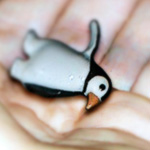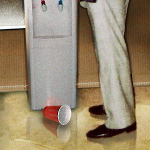 I’m humming almost inaudibly to the fan of the overhead projector. Occasionally I vary my pitch just to hear the two tones beat, but overall I prefer to match the even tone of the projector. It’s easily the warmest thing in the conference room. None of my coworkers seem to have caught on to the fact that I’m humming, which is ideal, since I’m subscribing more and more to the belief that it’s the only thing keeping me from losing my mind altogether.
I’m humming almost inaudibly to the fan of the overhead projector. Occasionally I vary my pitch just to hear the two tones beat, but overall I prefer to match the even tone of the projector. It’s easily the warmest thing in the conference room. None of my coworkers seem to have caught on to the fact that I’m humming, which is ideal, since I’m subscribing more and more to the belief that it’s the only thing keeping me from losing my mind altogether.
Fortunately, someone has brought us delicious secular holiday cookies. But even then my appetite is dampened by the the tinkling of our shackles–the accessories of professional captivity–as we reach for the complimentary confections. To be fair, there are but two things that explain my aversion to meetings: the topics of conversation, and the actual rooms they take place in. The two concepts are not as distantly related as one might imagine.
The conference room’s troublesome feng shui baffles concentration. The attempt to form cohesive thought is as easy as urinating while a puppy is staring at you. Yet, other than my coworkers, there are no obvious physical obstructions to speak of, so what’s the problem? The company hired hip young interior designers when it was flush with cash, which all but ensured that the walls would be strewn with red state-sized canvases featuring abstract splashes of corporate camouflage. But though the interior designers were well-versed in feng shui, they failed to take into account the fact that 30 bodies is enough to change the balance of any room. Indeed, feng shui is akin to quantum physics in that physical constants do not exist. Balance can exist only so long as no one enters a room, because to occupy a room is to change its nature. In fact, if a room is to maintain its integrity then no one should even be allowed to observe it, which would have the additional benefit of solving the meeting problem once and for all.
At the heart of any meeting is the discourse, and this meeting is no different. This morning the captives are told about the exciting business opportunities that abound, and the voice becomes a weightless silk wound around detached syllables and phonemes. I look down at my soft feminine hands. Baby hands, really. They’ve seen no work, and my bones would shatter if I ever dared pick up a hoe. And how long has my skin been transparent? I can see the grain of the table through my palms. Meanwhile, we’re told that not taking advantage of a business opportunity is just, “leaving money on the ground.”
I’ve heard the phrase before, but it was different last time. Another executive had said that letting opportunities pass us by was akin to “leaving money on the table.” The idea of loose money–cash money–is beyond their ken. The real story is revealed in their narrative: Perhaps the money had been on the table at one point, but no one had claimed it, and eventually the wind came through and blew the money to the ground like autumn leaves. The chance to witness a nascent business metaphor in its gestation, before the terms have settled, is fascinating, like observing the development of a new breed of poisonous hornet. Before the metaphor is delivered we’ll hear about money on a desk, or cash in the stairwell, or pennies off a dead man’s eyes.
The solution is clear: What we need is to have automated furniture that changes position relative to the number of bodies in the room. The movement might be subtle, and silent, but everyone would benefit from the harmonious redistribution. Even more effective would be furniture that acted to increase meeting efficiency by redistributing ineffectual members of the team right out the door. An energetic young manager prattles on about something he learned at a conference, not failing to use the phrase “low hanging fruit” at least three times. Then, slowly, his chair pulls away from the table, and begins moving toward the door. Without breaking the soul-depleting narrative, our middle manager grabs at the edge of the conference table, but the furniture’s servos are insistent, and pull until the employee’s knuckles are numb. We watch the manager wheel by, and he modifies his rhetoric in a heroic attempt to remain relevant, but as the door closes behind him there’s no denying that the mood of the entire room has lifted perceptibly.
My belief is that it’s the very structure of our meeting rooms that foster the banality of trade discourse. The wide convex conference tables, the track lights with frosted glass shades, and the chairs that force recline upon touch, draw sophistic colloquy from our lips like ship-farers drawn to shoal by the sirens’ song. It would be a different story if my coworkers were made to cling to ropes over a fiery pit. The points of discussion would be ticked off in record time then, with the primary order of business focusing on how to reach the ledge to safety. Contamination by flesh-eating bacteria might also enliven our assemblies, particularly if the antibiotics were hidden somewhere at random within the building. Raise the stakes and a few essential things become relevant, that’s the idea. You’re never more relevant than when pieces of your body are actually falling off as you dig through your coworkers’ waste cans.
Alas, these things are but the futile dreams of your hapless onlooker. Futile, perhaps, but why not also spiritually lucrative? To overlook these things, that would be leaving money in the bear trap.
 Agent of torment Fred Brookbank is recounting a conversation we shared earlier. As I spin interest from revulsion–a latter day Rumpelstiltskin, I am–Kelly will listen attentively to anything the man says, because she’s not really listening to anything. I know this because whenever Fred looks at me, I glance at Kelly and see her take advantage of Fred’s redirected attention to adjust something on her person. Straightening her blouse, shifting in her seat, or brushing her hair behind her ear–she wants to impress Fred. She’s doing it slowly, the way a lioness creeps forward only when her prey isn’t looking.
Agent of torment Fred Brookbank is recounting a conversation we shared earlier. As I spin interest from revulsion–a latter day Rumpelstiltskin, I am–Kelly will listen attentively to anything the man says, because she’s not really listening to anything. I know this because whenever Fred looks at me, I glance at Kelly and see her take advantage of Fred’s redirected attention to adjust something on her person. Straightening her blouse, shifting in her seat, or brushing her hair behind her ear–she wants to impress Fred. She’s doing it slowly, the way a lioness creeps forward only when her prey isn’t looking. “I talked to him about the loan and he said he’d call me back.”
“I talked to him about the loan and he said he’d call me back.” The path from my office to the microwave bank in the kitchenette takes me through each of my office’s departments like the “It’s a Small World” conveyor at Disney World. Every tribe is huddled into its respective cluster, each with its own unique culture. For the hapless isolationist this trip affords a greater than ideal opportunity for engagement, but as I’ve been treading the same route for nigh on a decade, I’ve come to rely on my instincts to see me through. In fact there are times when I don’t realize I’ve made the trip until I’m back at my desk, hunched over my gruel.
The path from my office to the microwave bank in the kitchenette takes me through each of my office’s departments like the “It’s a Small World” conveyor at Disney World. Every tribe is huddled into its respective cluster, each with its own unique culture. For the hapless isolationist this trip affords a greater than ideal opportunity for engagement, but as I’ve been treading the same route for nigh on a decade, I’ve come to rely on my instincts to see me through. In fact there are times when I don’t realize I’ve made the trip until I’m back at my desk, hunched over my gruel. My friend Julia is so slight, so unassuming, that meeting her is like having a premonition that you’ll meet her. It’s not so much that she doesn’t leave an impression, but rather that it’s difficult to interpret it. “Let me show you something,” she was saying to me.
My friend Julia is so slight, so unassuming, that meeting her is like having a premonition that you’ll meet her. It’s not so much that she doesn’t leave an impression, but rather that it’s difficult to interpret it. “Let me show you something,” she was saying to me. My office used to be a place where I would hide in fear as the besuited folk plowed their cubicle crops. But now my office resembles the aftermath of a freak industrial accident, and as I lay draped over my designer chair my superiors fall over themselves to praise my good work. It’s no accident that papers are strewn across every available horizontal surface, or that my desk is festooned with dozens of writing instruments, redundant office appliances, and stray pieces from things that I didn’t know what they were to begin with. The fact is that the cleanliness of my office is inversely proportional to my standing at the company, and right now I’m a superstar.
My office used to be a place where I would hide in fear as the besuited folk plowed their cubicle crops. But now my office resembles the aftermath of a freak industrial accident, and as I lay draped over my designer chair my superiors fall over themselves to praise my good work. It’s no accident that papers are strewn across every available horizontal surface, or that my desk is festooned with dozens of writing instruments, redundant office appliances, and stray pieces from things that I didn’t know what they were to begin with. The fact is that the cleanliness of my office is inversely proportional to my standing at the company, and right now I’m a superstar. Several years ago the print shop I worked for went through one of its “employees first” episodes that typically develops in the fertile valley between layoff seasons. In an economy classified by irrational exuberance, the shop’s management were the very embodiment of giddy generosity, which I likened to a congregation of apple-cheeked uncles, fresh in from abroad, whose pockets were filled with all manner of exotic gifts for their favorite nephews. It was complimentary bagels every morning, and pizza for lunch on Fridays. Of course, during such periods of cherubic generosity a long memory would serve the employee well, in particular the understanding that a jocular manager should be treated with the same respect afforded to a freshly-fed pit viper: they’re only docile for the time being, but when that first hunger pang hits…
Several years ago the print shop I worked for went through one of its “employees first” episodes that typically develops in the fertile valley between layoff seasons. In an economy classified by irrational exuberance, the shop’s management were the very embodiment of giddy generosity, which I likened to a congregation of apple-cheeked uncles, fresh in from abroad, whose pockets were filled with all manner of exotic gifts for their favorite nephews. It was complimentary bagels every morning, and pizza for lunch on Fridays. Of course, during such periods of cherubic generosity a long memory would serve the employee well, in particular the understanding that a jocular manager should be treated with the same respect afforded to a freshly-fed pit viper: they’re only docile for the time being, but when that first hunger pang hits… I’m humming almost inaudibly to the fan of the overhead projector. Occasionally I vary my pitch just to hear the two tones beat, but overall I prefer to match the even tone of the projector. It’s easily the warmest thing in the conference room. None of my coworkers seem to have caught on to the fact that I’m humming, which is ideal, since I’m subscribing more and more to the belief that it’s the only thing keeping me from losing my mind altogether.
I’m humming almost inaudibly to the fan of the overhead projector. Occasionally I vary my pitch just to hear the two tones beat, but overall I prefer to match the even tone of the projector. It’s easily the warmest thing in the conference room. None of my coworkers seem to have caught on to the fact that I’m humming, which is ideal, since I’m subscribing more and more to the belief that it’s the only thing keeping me from losing my mind altogether. Jan is going over the production schedule, his words spilling out at maximum velocity. He’s well-versed in the intricacies of project management. It’s his passion, so there’s no need for him to search for words, no witty asides to pad the monologue. Further, he knows how to speak like an adult, with an even staccato cadence and an impressive vocabulary by any measure. He makes preemptive oblique references to counterpoints I might raise without breaking the flow, and raises a single eyebrow as he riffs on a matrix of potential implications. The man is a maestro of the salient point, a rhetorical surgeon.
Jan is going over the production schedule, his words spilling out at maximum velocity. He’s well-versed in the intricacies of project management. It’s his passion, so there’s no need for him to search for words, no witty asides to pad the monologue. Further, he knows how to speak like an adult, with an even staccato cadence and an impressive vocabulary by any measure. He makes preemptive oblique references to counterpoints I might raise without breaking the flow, and raises a single eyebrow as he riffs on a matrix of potential implications. The man is a maestro of the salient point, a rhetorical surgeon. We’ve gathered in the cafeteria area.
We’ve gathered in the cafeteria area.